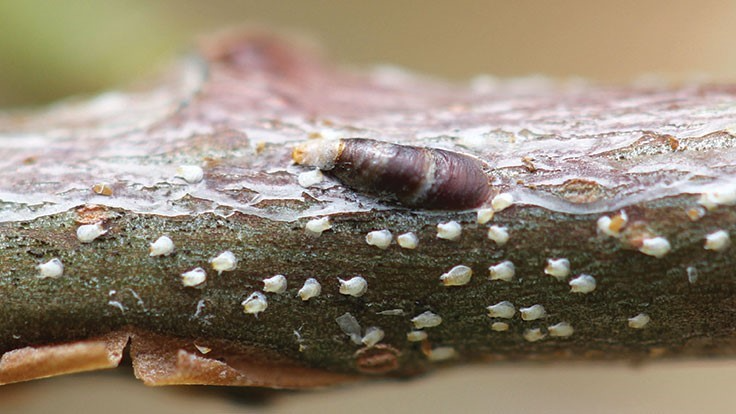Scale insects can be divided into two categories:
armored scale and soft scale.
Behavior and management are different for each group.
Both groups live beneath waxy covers that protect them from predators, parasitoids and pesticides.
Soft scales secrete a waxy layer over themselves that cannot be separated from their body. They also excrete sugary honeydew and may move from branches to leaves during their life cycle.
In contrast, armored scales live beneath a waxy cover that is not attached to their body.
The cover (also called a test) can be removed to reveal the insect hidden below.
Armored scales typically do not move once they begin to feed and do not produce honeydew.
Armored scales are also some of the toughest nursery pests,
they cause severe plant damage
Their “armor” makes them difficult for growers to manage effectively.
Their preferred food is many of the trees and shrubs in your nursery.
Some of the most common armored scale species in nurseries are
euonymus scale,
tea scale,
Japanese maple scale,
false oleander scale
juniper scale.
Life cycle: Eggs hatch into legged, mobile nymphs known as crawlers, which wander around looking for new places to feed.
These crawlers attach themselves to the host plant — in the case of females, permanently. Males, upon maturity, seek out females to mate with.
Oystershell scale on quaking aspen
(Photo credits: United States National Collection of Scale Insects Photographs Archive, USDA Agricultural Research Service, Bugwood.org; Whitney Cranshaw, Colorado State University, Bugwood.org)
Appearance: Armored scales have a flattened, platelike cover that is less than 1-inch in diameter.
The covers often have a differently colored, slight protuberance and concentric rings may form as nymphs grow and their cover enlarges.
Control: In general, avoid using contact insecticides
Most contact insecticides cannot penetrate the waxy covering on nymphs and adults,
so the crawler stage is the only life stage that these insecticides control.
Horticultural oils are safe to use and are especially good choices for sensitive areas.
Because of their short residual, they help to conserve beneficial insect species.
If possible, time spray applications to coincide with the scale crawler stage, which is most susceptible to all insecticides.
Trees and shrubs can be sprayed during the growing season with 1 to 2 percent horticultural oil.
This rate would be 2½ to 5 tablespoons of oil per gallon of water.
(Nursery Management, MATT MCCLELLAN)
Copyright © 2019 Horticulture Services, All rights reserved.
You are receiving this email because you wanted to be notified of upcoming Pesticide Points News and Workshops
Our mailing address is:
Horticulture-Services
886 Leigh Lane
Gallatin. Tennessee 37066
Add us to your address book
Want to change how you receive these emails?
You can update your preferences or unsubscribe from this list.
Oystershell Scale


